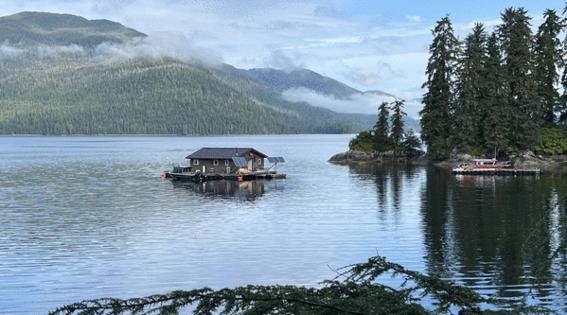Trump administration moves to rescind Roadless Rule, potentially setting stage for expanded harvests in Tongass National Forest
Published in News & Features
ANCHORAGE, Alaska — The Trump administration said Monday that it plans to rescind the Roadless Rule to remove restrictions on timber harvests and road-building in national forests, including the Tongass National Forest in Southeast Alaska.
The move drew swift condemnation, including in Alaska where conservation groups and some village leaders in the region said it could hurt subsistence and remove buffers against climate change.
The move is also likely to prolong the decades-long fight over the issue.
The first Trump administration repealed the 2001 rule for the Tongass National Forest, inviting legal pushback. It was reinstated under the Biden administration, drawing opposition from Alaska U.S. Sens. Lisa Murkowski and Dan Sullivan. U.S. Rep. Nick Begich, R-Alaska, said on Facebook on Monday that he supported the repeal.
Agriculture Secretary Brooke Rollins said in a statement Monday that repealing the rule will affect 59 million acres.
“Once again, President Trump is removing absurd obstacles to common sense management of our natural resources by rescinding the overly restrictive roadless rule,” Rollins said in a prepared statement. “This move opens a new era of consistency and sustainability for our nation’s forests. It is abundantly clear that properly managing our forests preserves them from devastating fires and allows future generations of Americans to enjoy and reap the benefits of this great land.”
Rescinding the rule will also allow much of the land to be managed locally to alleviate wildfire risks that are high or very high in many areas, the agency said in the statement.
Opponents of the measure vowed to fight the repeal. They said that eliminating the Roadless Rule would especially impact the Tongass, damaging wildlife that Alaska Native communities rely on for food.
“Our forests are just now healing from the extensive clear-cut logging in the past,” said Joel Jackson, president of the Organized Village of Kake, located in the Tongass. “Number one is food security, and our deer and moose are rebounding. The remaining old growth timber is so important for providing shelter, the berries, and our medicines. It provides shade for our streams to keep them cool so our salmon can return year after year.”
“Trump’s plan to revoke protections in the Tongass National Forest is both reckless and ignores the will of the people who will be most impacted by this move,” said Meda DeWitt, Alaska senior manager at The Wilderness Society. “Logging this irreplaceable landscape threatens not only biodiversity and climate resilience, but the cultural survival of communities who have cared for this land since time immemorial.”
Trump issued an executive order in March to expand timber production in part on national forest lands. That was followed by a memo from Rollins calling for more timber production and declaring that 113 million acres — more than half of the nation’s forest lands — faced an emergency situation from declining health or high wildfire risk.
Conservation groups have said the emergency declaration is poorly justified and designed to increase logging and reduce environmental protections, while benefiting the timber industry.
The Roadless Area Conservation Rule was adopted at the end of the Clinton administration in 2001. It originally prohibited new roads across roughly 58 million acres of forestland nationwide.
It also largely put a stop to new infrastructure across approximately 9.4 million acres of the Tongass. At about 17 million acres, the Tongass is by far the largest national forest in the country.
_____
©2025 Anchorage Daily News. Visit at adn.com. Distributed by Tribune Content Agency, LLC.







Comments